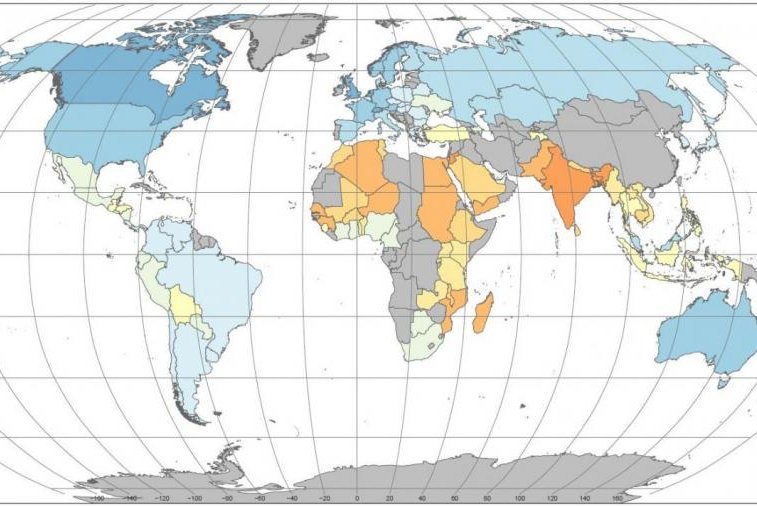Scientists used 20-years of food systems research to rate the sustainability of food systems in countries across the globe. Blue represents higher levels of sustainability, while orange and red represent lower sustainability scores. Photo by
Béné et al., International Center for Tropical Agriculture
Nov. 25 (UPI) -- Scientists have published a new world map featuring the sustainability rate of regional food systems. The map could help researchers better understand the links between diet and climate change.
To build the new map, published Monday in the journal Scientific Data, scientists surveyed the last 20 years of scientific literature on global food systems. Researchers settled on 20 indicators of food system sustainability in 97 countries -- some wealthy, some impoverished and others somewhere in between.
Scientists organized the 20 indicators -- which included measurements like greenhouse gas emissions, the presence of fair trade practices, food price volatility and food waste -- into four categories: environment, economic, social and food and nutrition.
"This is the first attempt to empirically measure and characterize the sustainability of the food systems worldwide considering not only the dimension food security and nutrition, or environment, but also economic, and social dimensions," study co-author Camila Bonilla, researcher at the University of California, Davis, said in a news release.
Previous investigations of the relationships between diet and ecological and environmental health have been criticized for ignoring social and economic variables.
Several studies, including a report by the United Nations, suggest significant dietary changes -- and accompanying land-use changes -- are required to stave off climate change. But to transform global food systems, the researchers responsible for the latest paper argue scientists must better understand the relationships between socioeconomic variables and sustainability.
"The food system is probably the largest employer in the world, so the sustainability of food systems is also about the economic and social contributions of those hundreds of thousands of people and enterprises that are involved in some aspect of the system -- from production all the way to food retail and distribution and consumption," said lead study author Christophe Béné, senior policy expert with the International Center for Tropical Agriculture. "It means that the economic and social dimensions of food system sustainability cannot be ignored."
The work of Béné and his research partners highlighted a significant knowledge gap in the field.
"The reason is that national statistical systems, in both high- and lower-income countries, are collecting only a small portion of the information that is needed to build a comprehensive picture of the whole system," he said.
Researchers hope their latest efforts will help standardize food system sustainability research by establishing agreed upon sustainability indicators -- indicators that can be used to track changes in sustainability and inform climate change policy in the future.
"This research represents a critical step forward in understanding the relationship between the structure and function of food systems and their sustainability," said study co-author Steven Prager, senior scientist at CIAT. "The global food system is really a set of interconnected subsystems and this work offers one of the most systematic attempts to date to unpack food system dynamics, from farm to fork to policy."















